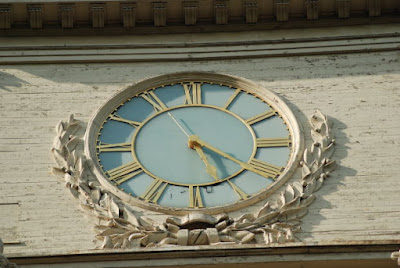When I'm writing a story, I pay particular attention to days and dates and often refer to calendars of that time figuring out my story timeline. My Colonial Courtships novella takes place in the year 1752, which was a remarkable year in history, for it was the first year that America began using the Gregorian calendar. So though I'm a wee bit late on this, I want to wish you all a HAPPY COLONIAL NEW YEAR!
260 years ago - March 25, 1751 - was the last first day of the new year in the Julian calendar. The following January 1 marked the first day of 1752 under the Gregorian calendar (and incidentally, Betsy Ross's birthday). 11 days were also omitted from the calendar that September. So both 1751 and 1752 were short years. The reason March 25th had been used as the first day of the year is because it coincides with the equinox when the length of day and night are equal, also the Feast of the Annunciation. But in accordance with the 1750 act of Parlament, England and its colonies were required to change calendars in 1752. Sometimes in research you may find a reference to a date such as February 1, 1701/02. This refers to "old style" and "new style" dating. To compensate for the discrepancy between the solar year and the Julian calendar and to be in sinc with most of Europe who had already made the change, the King ordered the 11 days to be wiped from September. The missing days created havoc for many, but workers were required to get paid for all 30 days of the month, although they did not exist. In fact, this is when "paid leave" came into being.
260 years ago - March 25, 1751 - was the last first day of the new year in the Julian calendar. The following January 1 marked the first day of 1752 under the Gregorian calendar (and incidentally, Betsy Ross's birthday). 11 days were also omitted from the calendar that September. So both 1751 and 1752 were short years. The reason March 25th had been used as the first day of the year is because it coincides with the equinox when the length of day and night are equal, also the Feast of the Annunciation. But in accordance with the 1750 act of Parlament, England and its colonies were required to change calendars in 1752. Sometimes in research you may find a reference to a date such as February 1, 1701/02. This refers to "old style" and "new style" dating. To compensate for the discrepancy between the solar year and the Julian calendar and to be in sinc with most of Europe who had already made the change, the King ordered the 11 days to be wiped from September. The missing days created havoc for many, but workers were required to get paid for all 30 days of the month, although they did not exist. In fact, this is when "paid leave" came into being.
1752 Calendar Change


Happy Colonial New Year to you too!
ReplyDeleteI learn something new every day. :)
Thanks for sharing this bit of history.
I think the old calendar is so fascinating and kind of like the new year beginning in spring:) Am reading a Betsy Ross bio right now that details that. Times have certainly changed. Love the pic of the lovely clock, Carla!
ReplyDeleteI did not know this! Glad you shared the info. Happy Colonial New Year to you too! :)
ReplyDeleteThanks, Carla, I remember reading this in my genealogy research because it can mess up dates for that. Spring seems like a better time to start a new year to me!
ReplyDeleteHow neat that you include such details! Very important, when you really think about it.
ReplyDeleteHow interesting...I learned something new today...thanks. I take for granted that calendar "time" has always been the way it is now in my own little American world, but going deeper into Bible study, I've also recently learned more about the way the Hebrew calendar calculations came to be--according to the moon & feasts. And their new year begins in the fall! Crazy! I had no idea there were this many differences in the calendars.
ReplyDeleteThanks for the lesson, and thanks for stopping by my blog & commenting yesterday. :)
Barb
Hi Carla -
ReplyDeleteThanks for this bit of history. There are so many things a historical author must know. Your blog is becoming a rich source for the writer.
Blessings,
Susan :)